University Pharmaceutical Medicine Report: Drug Discovery and Trials
VerifiedAdded on 2020/04/07
|8
|1460
|48
Report
AI Summary
This report provides an overview of pharmaceutical medicine, a discipline focused on the discovery, evaluation, and monitoring of pharmaceutical development. It highlights the significance of clinical trials and the ethical considerations involved in drug discovery. The report delves into the functional divisions of the drug discovery process, emphasizing the critical progression from preclinical research to clinical phases. It discusses the various phases of clinical research, including Phase 1 through Phase 4, and the role of the FDA in reviewing and approving new drugs. The report also touches upon the importance of benefit-risk assessment and the global nature of pharmaceutical medicine, concluding that advancements in human biology knowledge are crucial for discovering breakthrough medicines. The report also references the drug discovery process as a multidimensional process that takes around 10 years for developing new medicines.
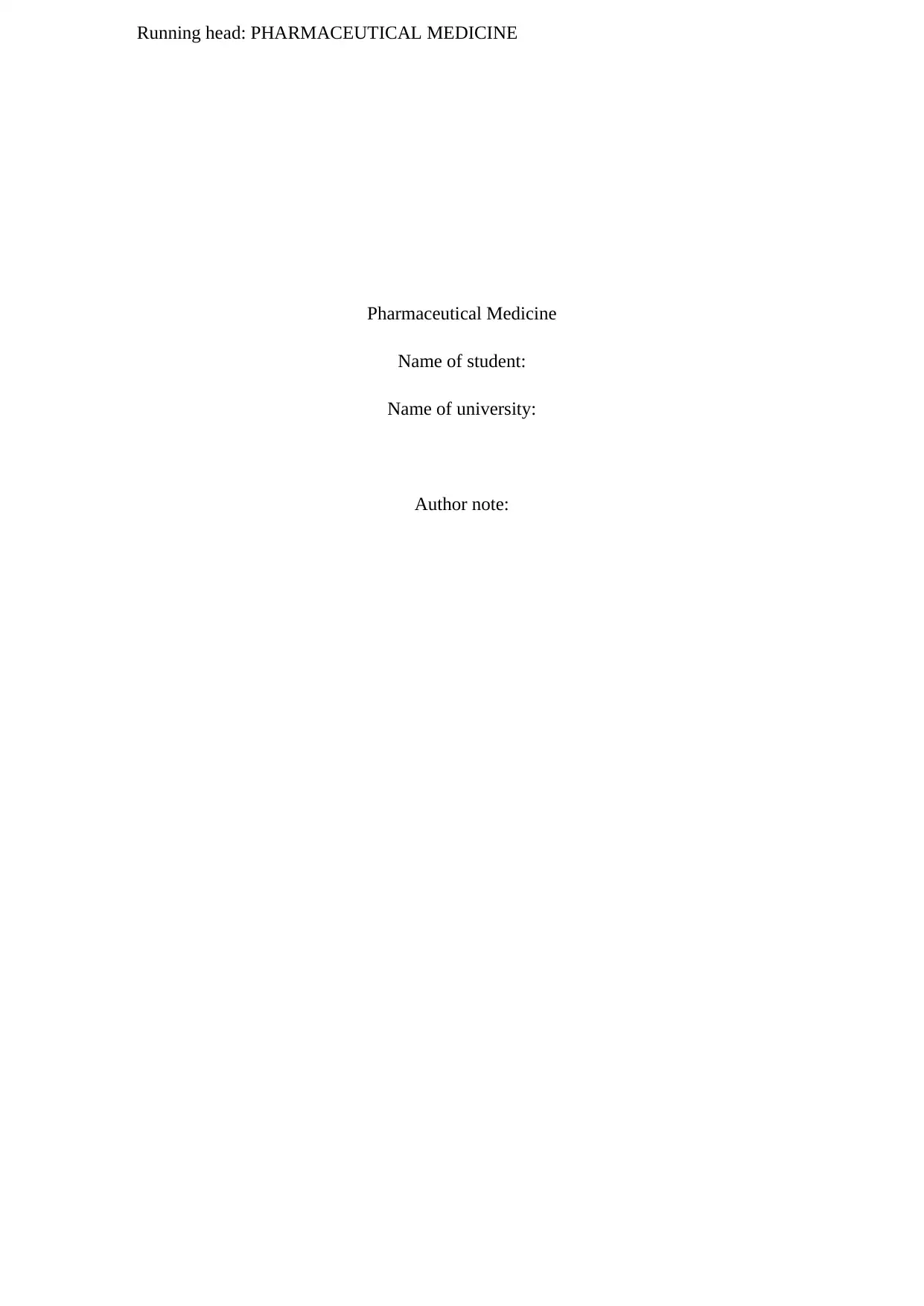
Running head: PHARMACEUTICAL MEDICINE
Pharmaceutical Medicine
Name of student:
Name of university:
Author note:
Pharmaceutical Medicine
Name of student:
Name of university:
Author note:
Paraphrase This Document
Need a fresh take? Get an instant paraphrase of this document with our AI Paraphraser
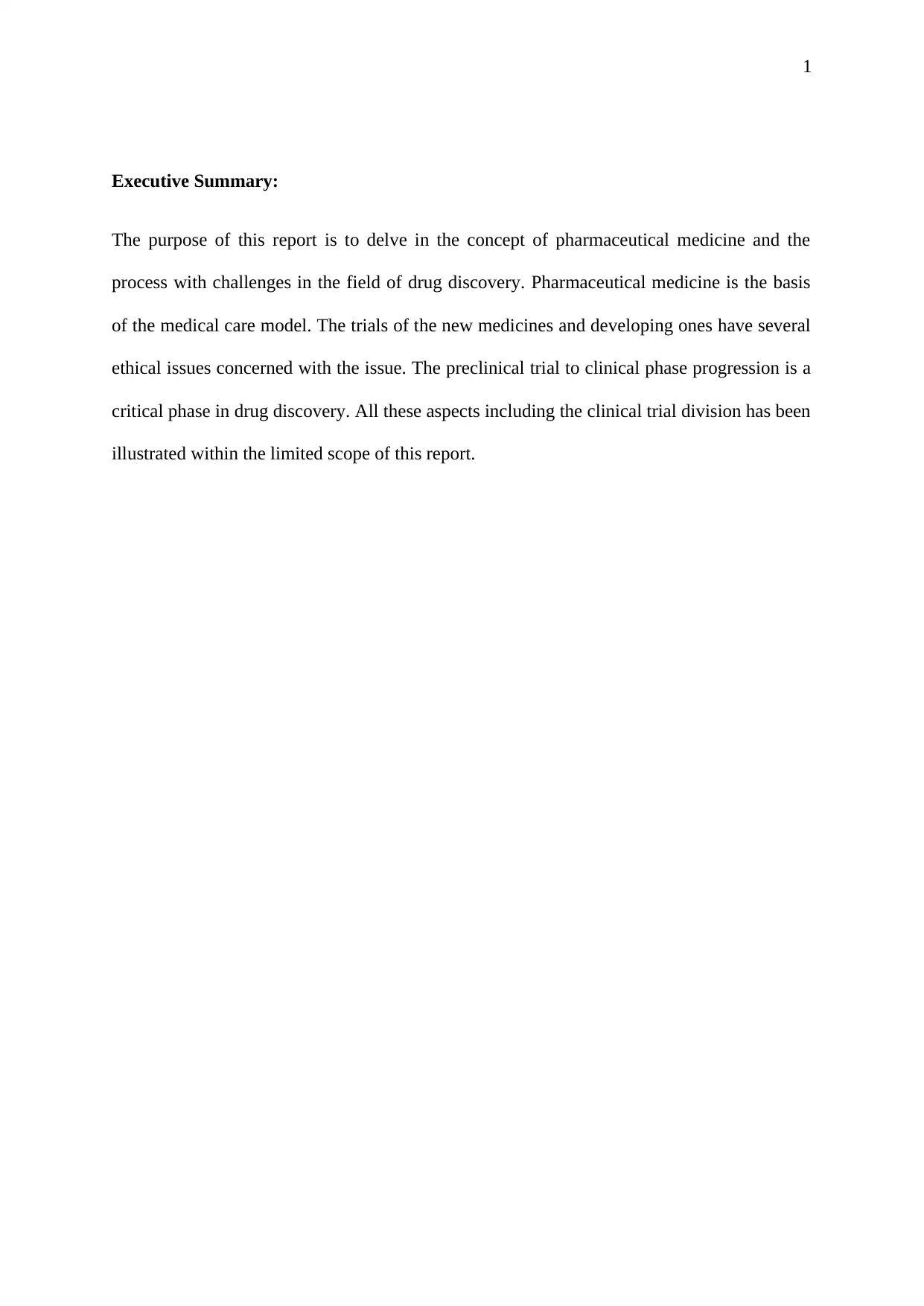
1
Executive Summary:
The purpose of this report is to delve in the concept of pharmaceutical medicine and the
process with challenges in the field of drug discovery. Pharmaceutical medicine is the basis
of the medical care model. The trials of the new medicines and developing ones have several
ethical issues concerned with the issue. The preclinical trial to clinical phase progression is a
critical phase in drug discovery. All these aspects including the clinical trial division has been
illustrated within the limited scope of this report.
Executive Summary:
The purpose of this report is to delve in the concept of pharmaceutical medicine and the
process with challenges in the field of drug discovery. Pharmaceutical medicine is the basis
of the medical care model. The trials of the new medicines and developing ones have several
ethical issues concerned with the issue. The preclinical trial to clinical phase progression is a
critical phase in drug discovery. All these aspects including the clinical trial division has been
illustrated within the limited scope of this report.
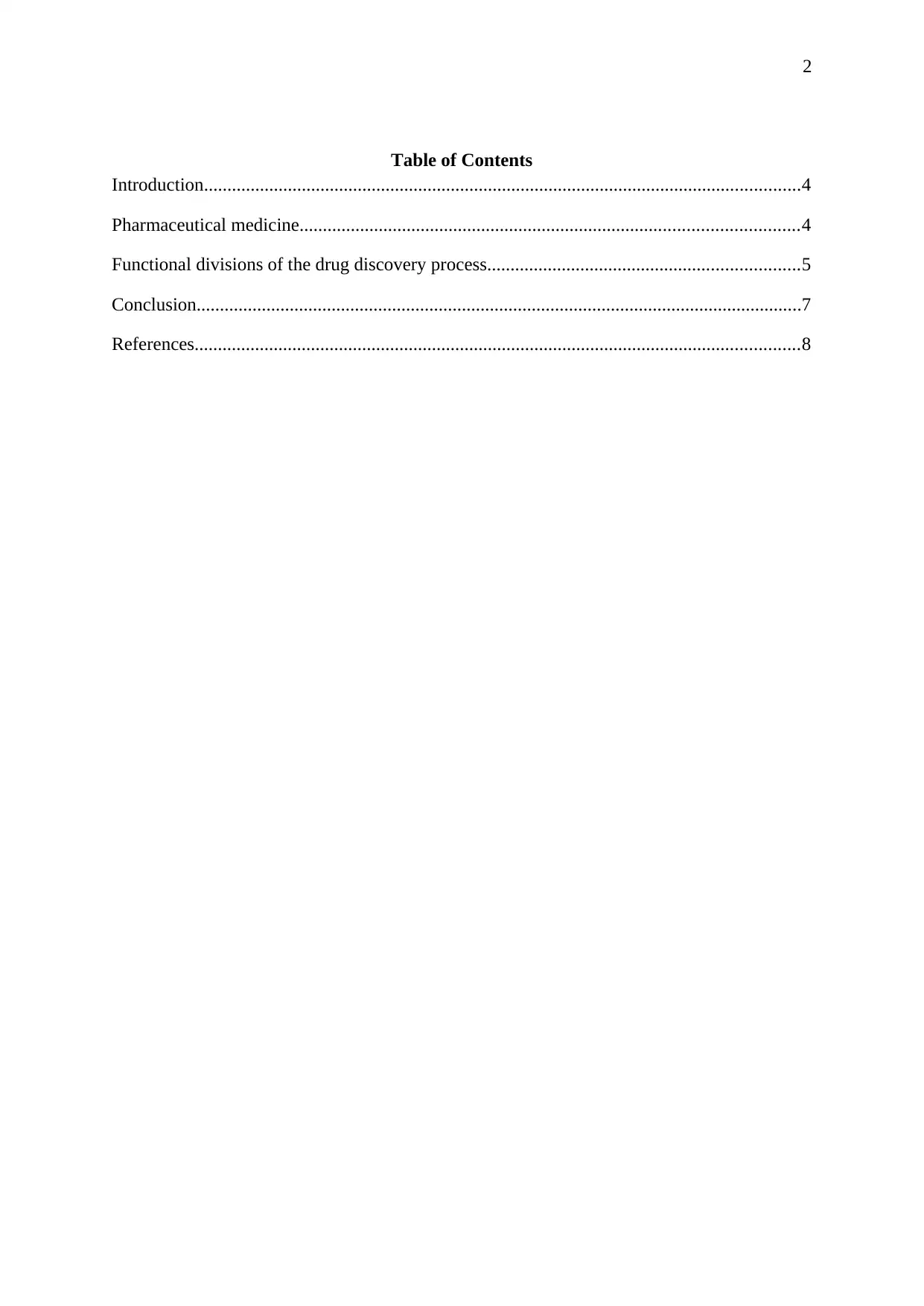
2
Table of Contents
Introduction................................................................................................................................4
Pharmaceutical medicine...........................................................................................................4
Functional divisions of the drug discovery process...................................................................5
Conclusion..................................................................................................................................7
References..................................................................................................................................8
Table of Contents
Introduction................................................................................................................................4
Pharmaceutical medicine...........................................................................................................4
Functional divisions of the drug discovery process...................................................................5
Conclusion..................................................................................................................................7
References..................................................................................................................................8
⊘ This is a preview!⊘
Do you want full access?
Subscribe today to unlock all pages.

Trusted by 1+ million students worldwide
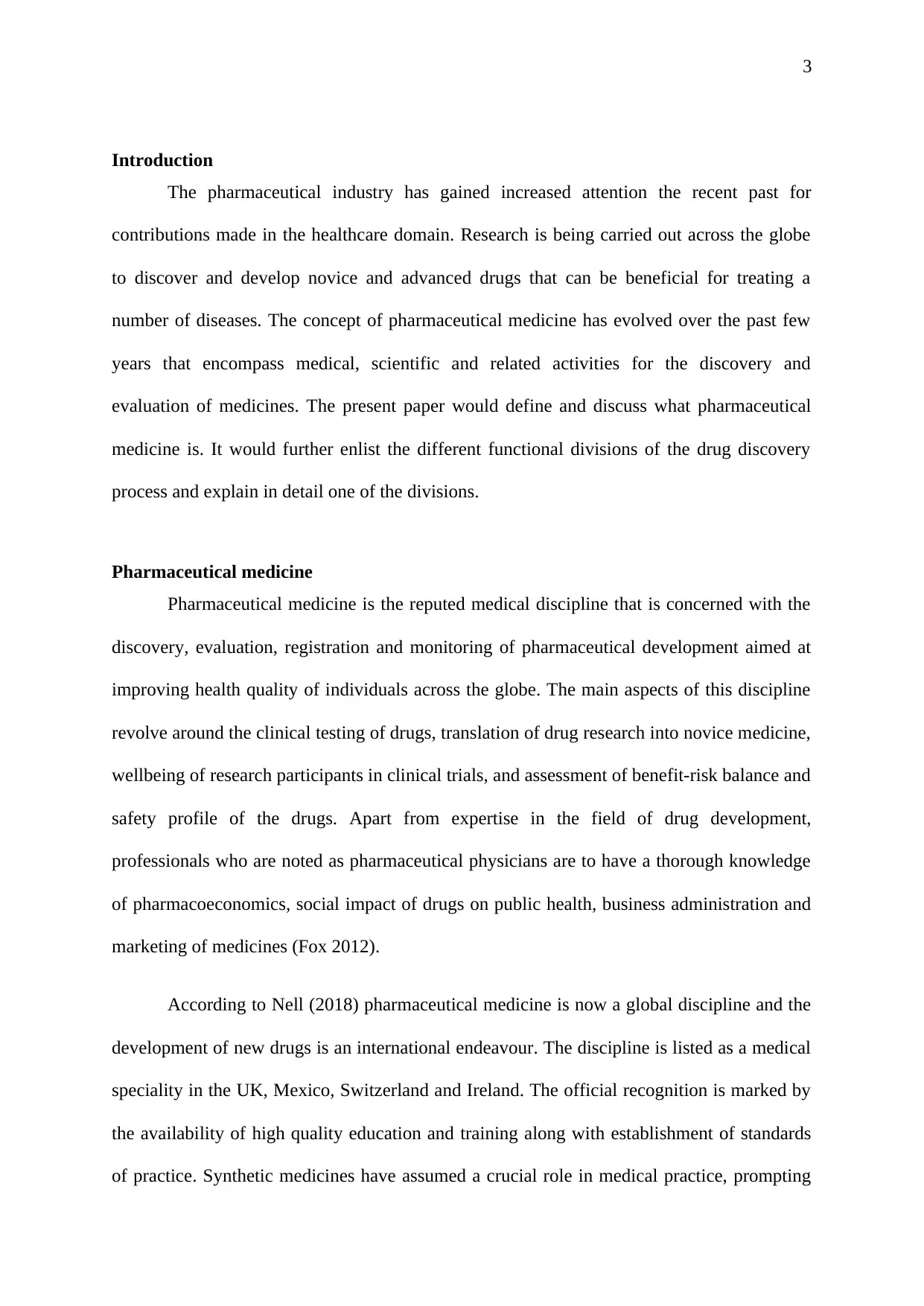
3
Introduction
The pharmaceutical industry has gained increased attention the recent past for
contributions made in the healthcare domain. Research is being carried out across the globe
to discover and develop novice and advanced drugs that can be beneficial for treating a
number of diseases. The concept of pharmaceutical medicine has evolved over the past few
years that encompass medical, scientific and related activities for the discovery and
evaluation of medicines. The present paper would define and discuss what pharmaceutical
medicine is. It would further enlist the different functional divisions of the drug discovery
process and explain in detail one of the divisions.
Pharmaceutical medicine
Pharmaceutical medicine is the reputed medical discipline that is concerned with the
discovery, evaluation, registration and monitoring of pharmaceutical development aimed at
improving health quality of individuals across the globe. The main aspects of this discipline
revolve around the clinical testing of drugs, translation of drug research into novice medicine,
wellbeing of research participants in clinical trials, and assessment of benefit-risk balance and
safety profile of the drugs. Apart from expertise in the field of drug development,
professionals who are noted as pharmaceutical physicians are to have a thorough knowledge
of pharmacoeconomics, social impact of drugs on public health, business administration and
marketing of medicines (Fox 2012).
According to Nell (2018) pharmaceutical medicine is now a global discipline and the
development of new drugs is an international endeavour. The discipline is listed as a medical
speciality in the UK, Mexico, Switzerland and Ireland. The official recognition is marked by
the availability of high quality education and training along with establishment of standards
of practice. Synthetic medicines have assumed a crucial role in medical practice, prompting
Introduction
The pharmaceutical industry has gained increased attention the recent past for
contributions made in the healthcare domain. Research is being carried out across the globe
to discover and develop novice and advanced drugs that can be beneficial for treating a
number of diseases. The concept of pharmaceutical medicine has evolved over the past few
years that encompass medical, scientific and related activities for the discovery and
evaluation of medicines. The present paper would define and discuss what pharmaceutical
medicine is. It would further enlist the different functional divisions of the drug discovery
process and explain in detail one of the divisions.
Pharmaceutical medicine
Pharmaceutical medicine is the reputed medical discipline that is concerned with the
discovery, evaluation, registration and monitoring of pharmaceutical development aimed at
improving health quality of individuals across the globe. The main aspects of this discipline
revolve around the clinical testing of drugs, translation of drug research into novice medicine,
wellbeing of research participants in clinical trials, and assessment of benefit-risk balance and
safety profile of the drugs. Apart from expertise in the field of drug development,
professionals who are noted as pharmaceutical physicians are to have a thorough knowledge
of pharmacoeconomics, social impact of drugs on public health, business administration and
marketing of medicines (Fox 2012).
According to Nell (2018) pharmaceutical medicine is now a global discipline and the
development of new drugs is an international endeavour. The discipline is listed as a medical
speciality in the UK, Mexico, Switzerland and Ireland. The official recognition is marked by
the availability of high quality education and training along with establishment of standards
of practice. Synthetic medicines have assumed a crucial role in medical practice, prompting
Paraphrase This Document
Need a fresh take? Get an instant paraphrase of this document with our AI Paraphraser
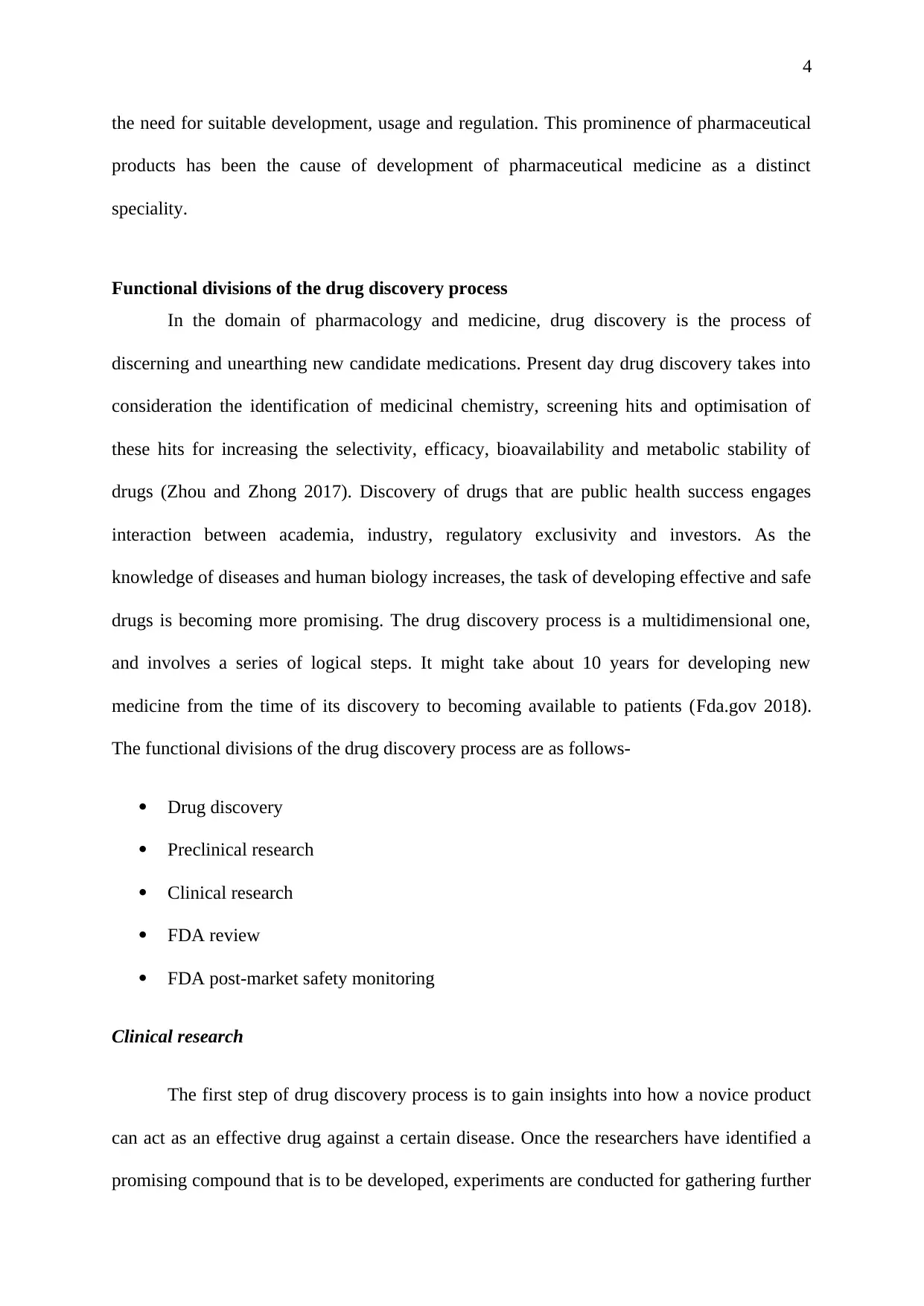
4
the need for suitable development, usage and regulation. This prominence of pharmaceutical
products has been the cause of development of pharmaceutical medicine as a distinct
speciality.
Functional divisions of the drug discovery process
In the domain of pharmacology and medicine, drug discovery is the process of
discerning and unearthing new candidate medications. Present day drug discovery takes into
consideration the identification of medicinal chemistry, screening hits and optimisation of
these hits for increasing the selectivity, efficacy, bioavailability and metabolic stability of
drugs (Zhou and Zhong 2017). Discovery of drugs that are public health success engages
interaction between academia, industry, regulatory exclusivity and investors. As the
knowledge of diseases and human biology increases, the task of developing effective and safe
drugs is becoming more promising. The drug discovery process is a multidimensional one,
and involves a series of logical steps. It might take about 10 years for developing new
medicine from the time of its discovery to becoming available to patients (Fda.gov 2018).
The functional divisions of the drug discovery process are as follows-
Drug discovery
Preclinical research
Clinical research
FDA review
FDA post-market safety monitoring
Clinical research
The first step of drug discovery process is to gain insights into how a novice product
can act as an effective drug against a certain disease. Once the researchers have identified a
promising compound that is to be developed, experiments are conducted for gathering further
the need for suitable development, usage and regulation. This prominence of pharmaceutical
products has been the cause of development of pharmaceutical medicine as a distinct
speciality.
Functional divisions of the drug discovery process
In the domain of pharmacology and medicine, drug discovery is the process of
discerning and unearthing new candidate medications. Present day drug discovery takes into
consideration the identification of medicinal chemistry, screening hits and optimisation of
these hits for increasing the selectivity, efficacy, bioavailability and metabolic stability of
drugs (Zhou and Zhong 2017). Discovery of drugs that are public health success engages
interaction between academia, industry, regulatory exclusivity and investors. As the
knowledge of diseases and human biology increases, the task of developing effective and safe
drugs is becoming more promising. The drug discovery process is a multidimensional one,
and involves a series of logical steps. It might take about 10 years for developing new
medicine from the time of its discovery to becoming available to patients (Fda.gov 2018).
The functional divisions of the drug discovery process are as follows-
Drug discovery
Preclinical research
Clinical research
FDA review
FDA post-market safety monitoring
Clinical research
The first step of drug discovery process is to gain insights into how a novice product
can act as an effective drug against a certain disease. Once the researchers have identified a
promising compound that is to be developed, experiments are conducted for gathering further
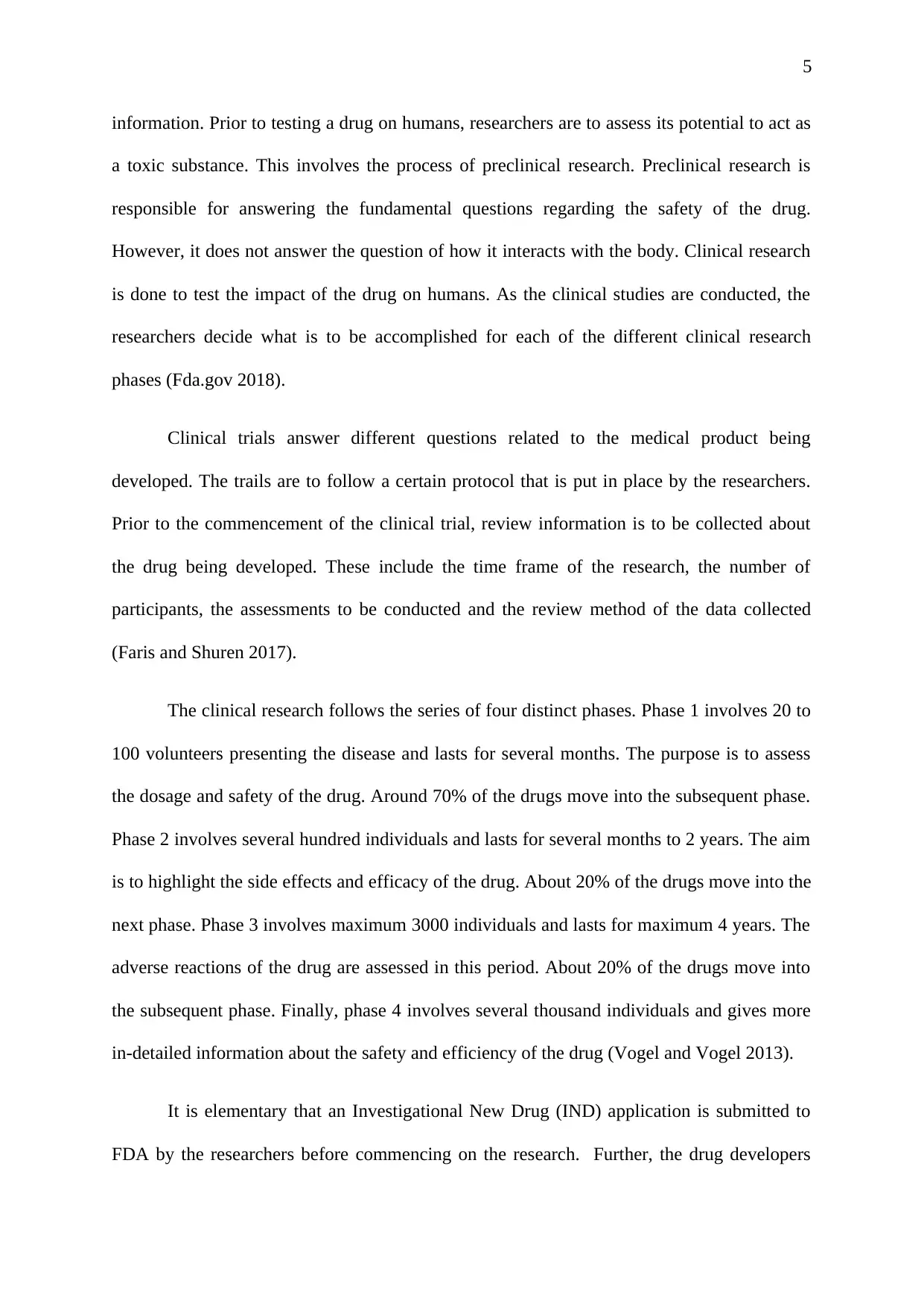
5
information. Prior to testing a drug on humans, researchers are to assess its potential to act as
a toxic substance. This involves the process of preclinical research. Preclinical research is
responsible for answering the fundamental questions regarding the safety of the drug.
However, it does not answer the question of how it interacts with the body. Clinical research
is done to test the impact of the drug on humans. As the clinical studies are conducted, the
researchers decide what is to be accomplished for each of the different clinical research
phases (Fda.gov 2018).
Clinical trials answer different questions related to the medical product being
developed. The trails are to follow a certain protocol that is put in place by the researchers.
Prior to the commencement of the clinical trial, review information is to be collected about
the drug being developed. These include the time frame of the research, the number of
participants, the assessments to be conducted and the review method of the data collected
(Faris and Shuren 2017).
The clinical research follows the series of four distinct phases. Phase 1 involves 20 to
100 volunteers presenting the disease and lasts for several months. The purpose is to assess
the dosage and safety of the drug. Around 70% of the drugs move into the subsequent phase.
Phase 2 involves several hundred individuals and lasts for several months to 2 years. The aim
is to highlight the side effects and efficacy of the drug. About 20% of the drugs move into the
next phase. Phase 3 involves maximum 3000 individuals and lasts for maximum 4 years. The
adverse reactions of the drug are assessed in this period. About 20% of the drugs move into
the subsequent phase. Finally, phase 4 involves several thousand individuals and gives more
in-detailed information about the safety and efficiency of the drug (Vogel and Vogel 2013).
It is elementary that an Investigational New Drug (IND) application is submitted to
FDA by the researchers before commencing on the research. Further, the drug developers
information. Prior to testing a drug on humans, researchers are to assess its potential to act as
a toxic substance. This involves the process of preclinical research. Preclinical research is
responsible for answering the fundamental questions regarding the safety of the drug.
However, it does not answer the question of how it interacts with the body. Clinical research
is done to test the impact of the drug on humans. As the clinical studies are conducted, the
researchers decide what is to be accomplished for each of the different clinical research
phases (Fda.gov 2018).
Clinical trials answer different questions related to the medical product being
developed. The trails are to follow a certain protocol that is put in place by the researchers.
Prior to the commencement of the clinical trial, review information is to be collected about
the drug being developed. These include the time frame of the research, the number of
participants, the assessments to be conducted and the review method of the data collected
(Faris and Shuren 2017).
The clinical research follows the series of four distinct phases. Phase 1 involves 20 to
100 volunteers presenting the disease and lasts for several months. The purpose is to assess
the dosage and safety of the drug. Around 70% of the drugs move into the subsequent phase.
Phase 2 involves several hundred individuals and lasts for several months to 2 years. The aim
is to highlight the side effects and efficacy of the drug. About 20% of the drugs move into the
next phase. Phase 3 involves maximum 3000 individuals and lasts for maximum 4 years. The
adverse reactions of the drug are assessed in this period. About 20% of the drugs move into
the subsequent phase. Finally, phase 4 involves several thousand individuals and gives more
in-detailed information about the safety and efficiency of the drug (Vogel and Vogel 2013).
It is elementary that an Investigational New Drug (IND) application is submitted to
FDA by the researchers before commencing on the research. Further, the drug developers
⊘ This is a preview!⊘
Do you want full access?
Subscribe today to unlock all pages.

Trusted by 1+ million students worldwide
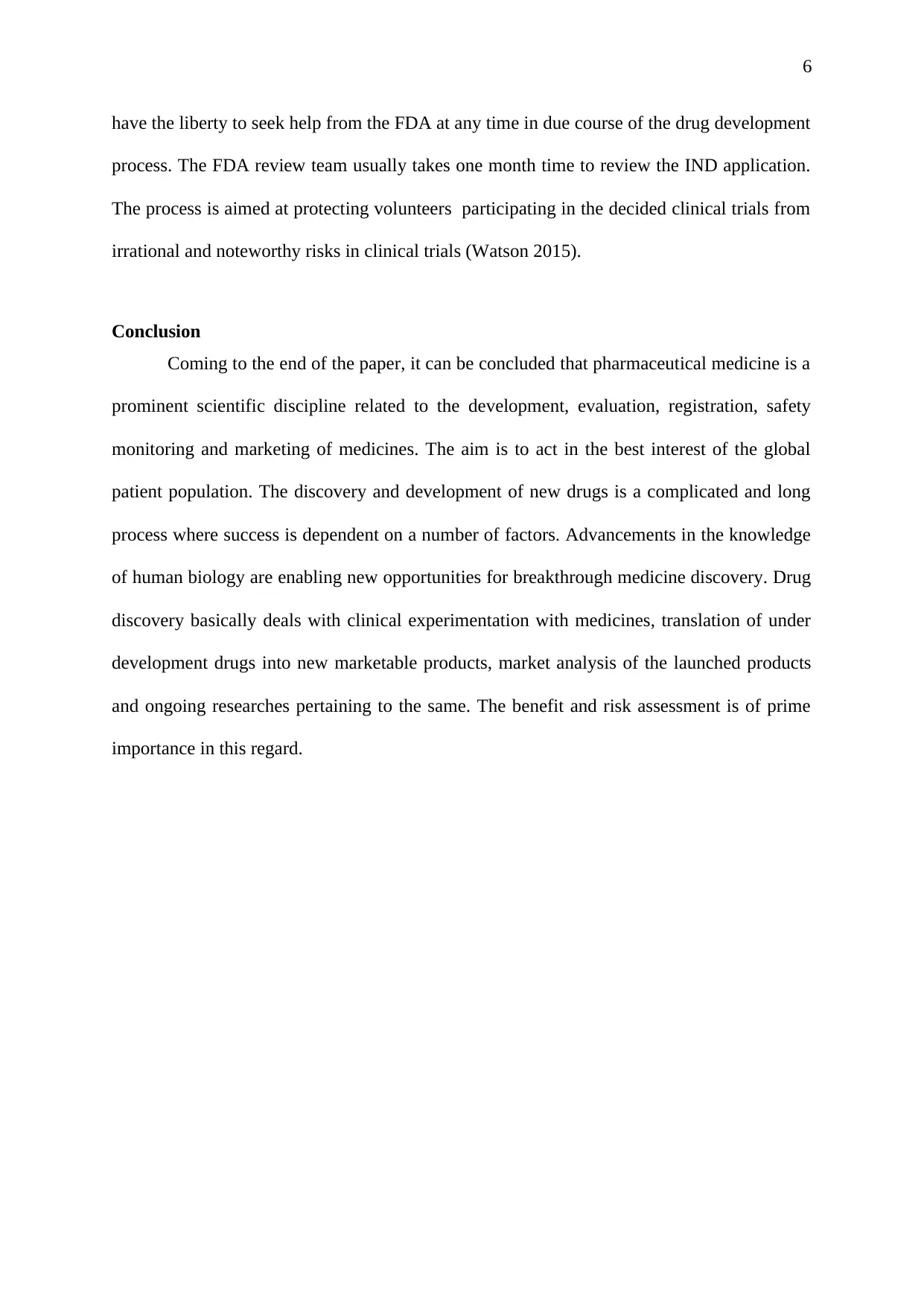
6
have the liberty to seek help from the FDA at any time in due course of the drug development
process. The FDA review team usually takes one month time to review the IND application.
The process is aimed at protecting volunteers participating in the decided clinical trials from
irrational and noteworthy risks in clinical trials (Watson 2015).
Conclusion
Coming to the end of the paper, it can be concluded that pharmaceutical medicine is a
prominent scientific discipline related to the development, evaluation, registration, safety
monitoring and marketing of medicines. The aim is to act in the best interest of the global
patient population. The discovery and development of new drugs is a complicated and long
process where success is dependent on a number of factors. Advancements in the knowledge
of human biology are enabling new opportunities for breakthrough medicine discovery. Drug
discovery basically deals with clinical experimentation with medicines, translation of under
development drugs into new marketable products, market analysis of the launched products
and ongoing researches pertaining to the same. The benefit and risk assessment is of prime
importance in this regard.
have the liberty to seek help from the FDA at any time in due course of the drug development
process. The FDA review team usually takes one month time to review the IND application.
The process is aimed at protecting volunteers participating in the decided clinical trials from
irrational and noteworthy risks in clinical trials (Watson 2015).
Conclusion
Coming to the end of the paper, it can be concluded that pharmaceutical medicine is a
prominent scientific discipline related to the development, evaluation, registration, safety
monitoring and marketing of medicines. The aim is to act in the best interest of the global
patient population. The discovery and development of new drugs is a complicated and long
process where success is dependent on a number of factors. Advancements in the knowledge
of human biology are enabling new opportunities for breakthrough medicine discovery. Drug
discovery basically deals with clinical experimentation with medicines, translation of under
development drugs into new marketable products, market analysis of the launched products
and ongoing researches pertaining to the same. The benefit and risk assessment is of prime
importance in this regard.
Paraphrase This Document
Need a fresh take? Get an instant paraphrase of this document with our AI Paraphraser
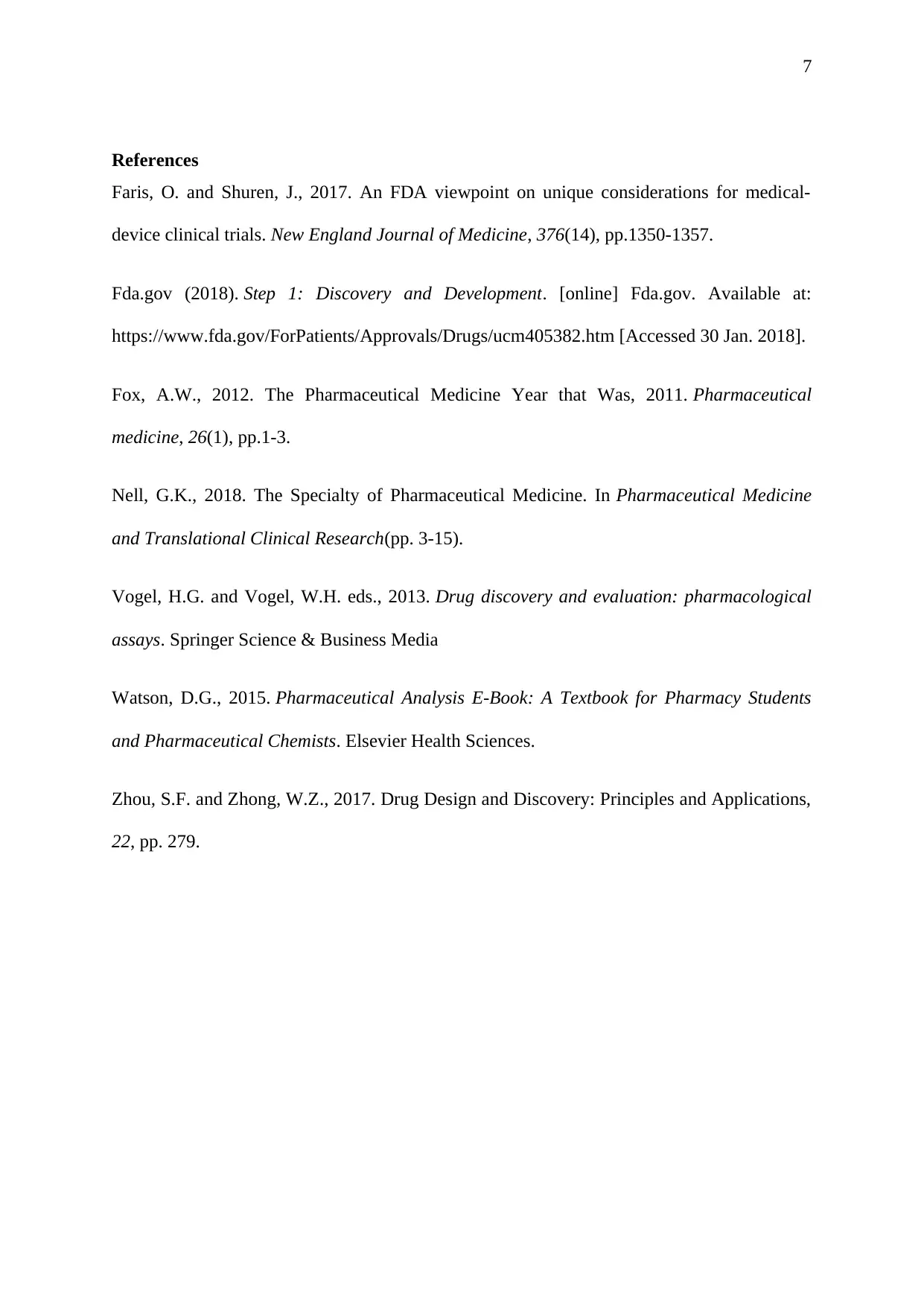
7
References
Faris, O. and Shuren, J., 2017. An FDA viewpoint on unique considerations for medical-
device clinical trials. New England Journal of Medicine, 376(14), pp.1350-1357.
Fda.gov (2018). Step 1: Discovery and Development. [online] Fda.gov. Available at:
https://www.fda.gov/ForPatients/Approvals/Drugs/ucm405382.htm [Accessed 30 Jan. 2018].
Fox, A.W., 2012. The Pharmaceutical Medicine Year that Was, 2011. Pharmaceutical
medicine, 26(1), pp.1-3.
Nell, G.K., 2018. The Specialty of Pharmaceutical Medicine. In Pharmaceutical Medicine
and Translational Clinical Research(pp. 3-15).
Vogel, H.G. and Vogel, W.H. eds., 2013. Drug discovery and evaluation: pharmacological
assays. Springer Science & Business Media
Watson, D.G., 2015. Pharmaceutical Analysis E-Book: A Textbook for Pharmacy Students
and Pharmaceutical Chemists. Elsevier Health Sciences.
Zhou, S.F. and Zhong, W.Z., 2017. Drug Design and Discovery: Principles and Applications,
22, pp. 279.
References
Faris, O. and Shuren, J., 2017. An FDA viewpoint on unique considerations for medical-
device clinical trials. New England Journal of Medicine, 376(14), pp.1350-1357.
Fda.gov (2018). Step 1: Discovery and Development. [online] Fda.gov. Available at:
https://www.fda.gov/ForPatients/Approvals/Drugs/ucm405382.htm [Accessed 30 Jan. 2018].
Fox, A.W., 2012. The Pharmaceutical Medicine Year that Was, 2011. Pharmaceutical
medicine, 26(1), pp.1-3.
Nell, G.K., 2018. The Specialty of Pharmaceutical Medicine. In Pharmaceutical Medicine
and Translational Clinical Research(pp. 3-15).
Vogel, H.G. and Vogel, W.H. eds., 2013. Drug discovery and evaluation: pharmacological
assays. Springer Science & Business Media
Watson, D.G., 2015. Pharmaceutical Analysis E-Book: A Textbook for Pharmacy Students
and Pharmaceutical Chemists. Elsevier Health Sciences.
Zhou, S.F. and Zhong, W.Z., 2017. Drug Design and Discovery: Principles and Applications,
22, pp. 279.
1 out of 8
Related Documents
Your All-in-One AI-Powered Toolkit for Academic Success.
+13062052269
info@desklib.com
Available 24*7 on WhatsApp / Email
![[object Object]](/_next/static/media/star-bottom.7253800d.svg)
Unlock your academic potential
Copyright © 2020–2026 A2Z Services. All Rights Reserved. Developed and managed by ZUCOL.





